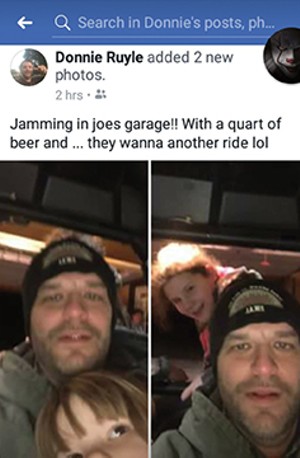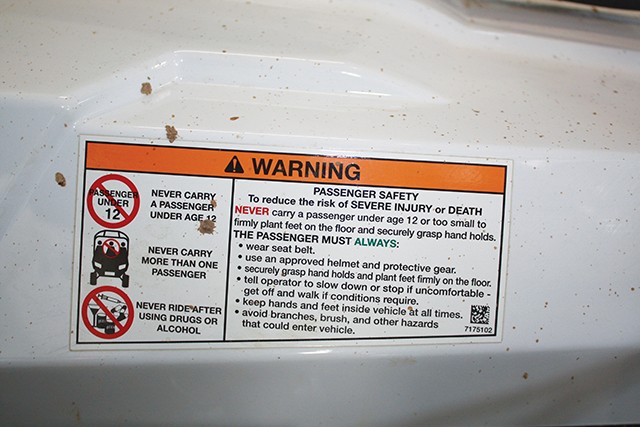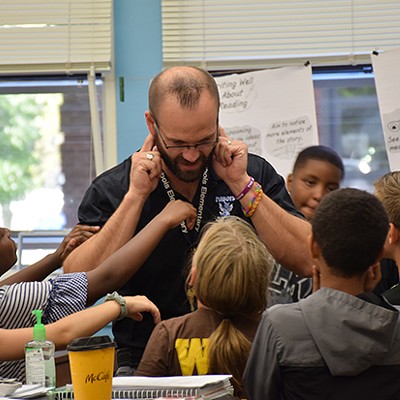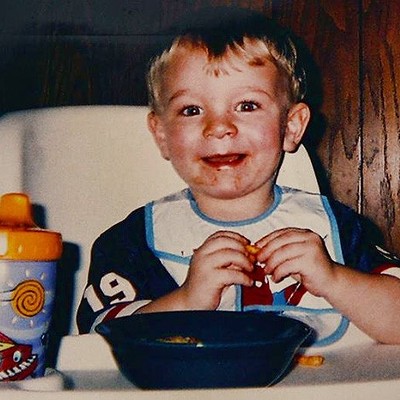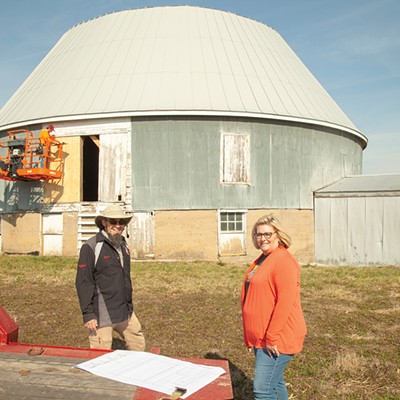She loved horses and the Green Bay Packers. She hated her curly hair. She was in the sixth grade at Gillespie Middle School. She didn’t like to run, but she played soccer anyway.
She’s been dead for nearly a year.
If she were alive still, Madyson Loftis, Mady for short, would be thinking of softball season and making slime and getting in trouble for making a mess. Instead, she’ll never be older than 11.
It was an accident, authorities say. But Melissa Loftis, Mady’s mother, doesn’t see her daughter’s death as a mishap.
“I’m so tired of hearing it was just an accident,” Loftis says. “Do you realize what he did?”
The “he” to whom Loftis refers is Donald Eugene Ruyle, Jr., the only adult aboard an overloaded all-terrain vehicle that flipped last Dec. 17, pinning Mady beneath the vehicle. It was dark. No one was wearing seatbelts or helmets. And Ruyle, 45, had been drinking. Again.
Police told the media that Ruyle’s son had been behind the wheel, but that’s not clear from reports provided by the Macoupin County sheriff’s office, which received different stories from Ruyle and his kin. Mady wasn’t in a position to say. She was unconscious when she was airlifted to a St. Louis hospital, where she died two days later without waking up.
A history of DUI
Ruyle is no stranger to cops or alcohol.
He has a record dating back to 1993, when he pleaded guilty to possessing alcohol before he turned 21. In 2001, he pleaded guilty to driving under the influence after being arrested by Gillespie police. He received court supervision and a fine.
Eventually, someone died.
Ruyle crossed the centerline in his pickup truck shortly after 8 p.m. on Sept. 15, 2005, while northbound on Illinois 138 just south of Mt. Clare, according to Illinois State Police reports and court files, hitting a Camaro driven by John R. Kaufman, 67, that was headed the opposite direction. Kaufman died. Ruyle, who suffered bruises and cuts around an eye, was taken to St. Francis Hospital in Litchfield, where a trooper reported the odor of alcohol was obvious in the emergency room.
Ruyle, a boilermaker, and a co-worker had gone straight to a Benld tavern that morning after their workday was canceled due to bad weather. They arrived shortly after 7 a.m. The two drank screwdrivers before heading to another bar, where they continued drinking vodka and orange juice. The co-worker told police he couldn’t remember how much they drank, only that he and Ruyle had each bought cocktails for themselves while also buying rounds for each other.
From the second tavern, the co-worker and Ruyle proceeded to a VFW club in Gillespie, where they continued drinking and ate lunch. The co-worker told police he started feeling buzzed and slowed down; Ruyle, he believed, was drunker than he was. After taking his co-worker home, Ruyle stopped at a friend’s house, where he drank a Pabst or two in less than 30 minutes, the friend told police, before heading to a tavern in Wood River, where Ruyle lost count of how many cocktails he drank before leaving at 6:30 p.m., nearly 12 hours after hitting his first bar.
Ruyle told police he didn’t remember anything about the collision. In one pocket, police found tablets that resembled Xanax in a pill bottle with Ruyle’s name on it; in another pocket, officers found marijuana.
A blood draw taken more than four hours after the crash showed a blood-alcohol content of .19 percent. Vince Moreth, then Macoupin County state’s attorney, told police that the case would be handled as a reckless homicide. Then, test results from Kaufman showed that the dead man had a blood-alcohol content of .166 percent, more than twice the legal limit of .08 percent.
Instead of reckless homicide, Ruyle was charged with aggravated DUI. He also was charged with improper lane usage and misdemeanor marijuana possession. He pleaded guilty to all counts and was sentenced to 364 days in the Macoupin County jail. Fines, various fees, restitution and court costs totaled $8,332.
Midway through his jail stint, Ruyle wrote to Macoupin County Circuit Court Judge Joseph Koval, asking that he be allowed to serve his time on weekends so that he could work during the week. He wrote that he was concerned about his kids and losing his home.
“It would really help me out with the situation I’m in now,” Ruyle wrote. The judge said no.
“My heart just dropped
Mady missed her friends. That’s why, her mother says, she went to Plainview to spend a weekend with Ruyle’s three kids.Ruyle and his children, ages four to 12, had once lived near the Loftis home in Benld, but he’d taken the kids and gone to live with his parents in the fall of 2017 after filing for divorce from his wife, Melissa Loftis says. “Mady was in love with the kids – they were best friends,” Loftis recalls. And so she and her husband said yes to a sleepover.
Loftis had planned to pick her daughter up at noon that Sunday. Mady begged to stay longer. “Mom, I’m having so much
fun,” Loftis remembers her daughter saying. And so they agreed that the sleepover would end at 8 p.m.
That gave Loftis and her husband time to finish painting a bathroom. At some point, they needed supplies, so they drove to Home Depot in Edwardsville. Loftis left her cellphone at home. When they returned, there was a police car in the driveway. “Are you Mady Loftis’ parents?” the officer asked.
“I screamed at the top of my lungs,” Loftis says.
Loftis and her husband Chris rushed to Children’s Hospital in St. Louis, where Mady had been airlifted. “And you know, I didn’t care, at that point, what happened,” Loftis recalls. “All I cared about was my daughter. Was she going to be OK?”
Within a half-hour of arriving at the hospital, someone sent a photo that Ruyle had posted on Facebook. Mady is in the frame. “Jamming in joes garage!!” Ruyle had written. “With a quart of beer and…they wanna another ride lol.” It’s the last picture Loftis has of her daughter.
“My heart just dropped,” she says.
Mady never had a chance. She’d suffered severe head injuries. Doctors said that her heart was giving out. Loftis and her husband decided to donate their daughter’s organs. It took nine hours, Loftis recalls, to prepare a room for the procedure. Finally, everything was ready. It will take between three minutes to an hour – do you want to stay with her, the head of the organ donor program asked. And three minutes after being disconnected from life support, Mady was gone.
Hundreds turned out for a memorial service held at the Gillespie High School gymnasium last Jan. 6. Before that, there was Christmas. Her parents had bought everything on their daughter’s list – the presents were all wrapped and under the tree, which Mady had decorated by herself, the first time she’d done it without help from mom. Now what? Loftis invited her daughter’s closest friends to Christmas dinner, where she gave them Mady’s gifts. A laptop. A makeup kit. Blankets. Necklaces and earrings.
“It was very rough,” Loftis remembers.
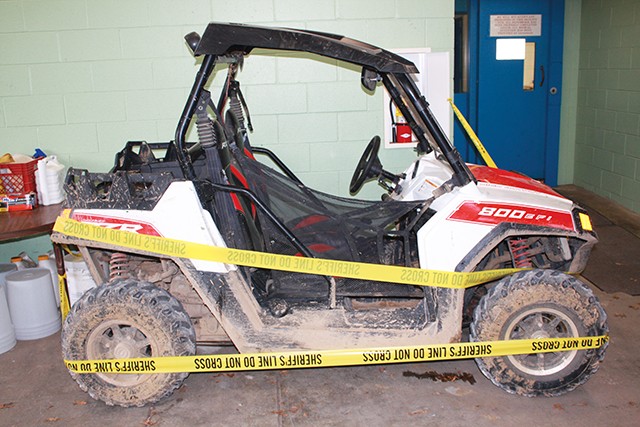
“Remember, you were driving”
“She’s the state’s attorney – she would know everything about the police reports and everything that happened,” Loftis said. But Watson’s answers, Loftis says, seemed too short. “I was a little disappointed,” Loftis says. “After meeting with her, there was just a feeling that I needed to read the police report.”
And so Loftis got copies of reports. And what had been questions became anger.
Until she read police reports, Loftis says she hadn’t known that her daughter had been riding on a crate in the rear cargo area of the ATV. There also was the matter of alcohol. Nearly two hours after the ATV flipped, a deputy noted that Ruyle’s eyes were glassy and bloodshot. Have you been drinking? Yes, I was drinking earlier today, Ruyle answered.
Deputies administered a preliminary breath test via a handheld device – unlike tests with more sophisticated machinery, PBT results aren’t admissible in court, but typically are used by police to determine whether more testing is needed. The test showed a blood-alcohol level of .054 percent, which would have put Ruyle at or near the .08 percent legal limit when the ATV crashed. No follow-up testing, with results admissible in court, was done.
Prosecutors can file DUI charges if blood-alcohol levels are less than .08 percent if they can show a driver was sufficiently impaired to be dangerous. But Ruyle told deputies that he wasn’t driving when the ATV flipped. Rather, he said that he’d started out behind the wheel, with his four-year-old daughter on his lap, but switched places with his 12-year-old son before the ATV tipped over after hitting a rut while going down a hill.
A deputy found the son limping in a driveway with a minor leg injury. As the deputy began speaking with the boy, Ruyle approached and gave permission for his son to be interviewed. “(The boy) proceeded to tell me his version of the story when his father Donald Ruyle, Jr. immediately interrupted by stating to (his son), ‘Remember, you were driving,’” the deputy wrote in his report. The boy told police that he’d been driving for five or 10 minutes before the crash, after switching places with his dad, and estimated his speed at between 10 and 15 miles per hour when he lost control. Ruyle said the ATV had been traveling as fast as 25 mph during the excursion.
Ruyle’s father had a different version, telling police the day after the wreck that the 12-year-old boy was driving when Ruyle and the four children left the house. Ruyle’s four-year-old daughter gave yet a different story, telling a deputy that her dad had been driving and that she had been sitting in his lap when the ATV crashed. Testimony from four-year-olds is usually barred in court on the grounds that such young children are not reliable.
A neighbor told police that he’d seen Ruyle driving the ATV about two hours before the crash. Ruyle, the neighbor said, had a girl in his lap, with a boy in the passenger seat and a boy and girl in the cargo area. He also had a beer in a coozie, the neighbor told deputies. Did you see the can’s label, deputies asked. “Nobody puts a soda in a coozie,” responded the neighbor. “If you need me, I will testify.”
A deputy who interviewed Ruyle at the hospital where his son was taken for treatment of injuries that proved minor said he smelled alcohol and asked Ruyle, who had already been tested, if he’d been drinking. Yes, Ruyle said, but he couldn’t remember how many beers he’d had or when he finished his last one. “I don’t usually drink that much,” Ruyle said. “I’ve had issues in the past.”
Ruyle ended the interview when deputies began asking about seatbelts – he said he couldn’t wear one because he had his daughter on his lap – and how fast the ATV had been traveling. “I get kind of sick to my stomach talking about it,” Ruyle told police, who had told him at the beginning that questioning was voluntary. “You said I could end it. I’m ending it.”
The session had lasted less than 13 minutes. Police never got another chance to speak with Ruyle or his kids.
One week after Mady died, Ruyle and his three children didn’t show up for an interview with deputies. At that point, the kids were under the care of Ruyle’s parents pursuant to a safety plan approved by the state Department of Children and Family Services, which had been notified of the tragedy. Ruyle’s father told police that his son couldn’t make appointments for his kids because of the safety plan, but a DCFS official said otherwise. The next day, Ruyle told police that he wouldn’t allow investigators to interview his kids.
Four days before Mady’s memorial service, police set up an interview with Ruyle, but he didn’t keep the appointment, telling a detective via voicemail that he’d already told police all that he knew. Ruyle soon got his kids back.
“There was a temporary safety plan providing for some additional assessment of the family, and it was terminated the next month as no longer necessary,” DCFS spokesman Neil Skene wrote in an email to Illinois Times.
Ruyle was issued three traffic citations, two for failure to use seatbelts and a third for allowing an unauthorized person to drive. All three tickets were dismissed at the request of the state’s attorney’s office on the grounds that the ATV wasn’t on a publicly maintained road.
“It just floors me”
Nearly a year later, Sheriff Shawn Kahl says he doubts investigators got the full story.
“We felt like we were not being told the truth, obviously,” the sheriff says. “You’ve just got to go by what you’re told. We had our suspicions he was not driving, the 12-year-old.”
But suspicion isn’t proof. Watson, the state’s attorney, refused an interview request, saying via an assistant that she would respond only in writing to written questions.
“Although Mr. Ruyle admitted to drinking alcohol and posted a photo, prior to the accident, DUI/Aggravated DUI was not considered,” Watson wrote. “There was no evidence presented that Mr. Ruyle was driving the (ATV) or in actual physical control of the (ATV) at the time of the accident. Mr. Ruyle’s BAC was below .08, which is the presumptive standard of intoxication for DUI. This presumption does not exist in non-driving cases.”
Bruce Beeman, attorney for Melissa Loftis and her husband, wrote two letters to Watson, sending her a copy of the Facebook post Ruyle made before the tragedy, and also talked with her via telephone. He says he spoke with the prosecutor about reckless conduct or child endangerment charges, which would not require proof that Ruyle was driving.
“I think, just the facts, just the police report and the information gleaned, is enough for an average person to come to their own conclusion,” Beeman says.
Has justice been done?
“I know the parents do not think so,” Beeman answers. “I think someone should just read the facts and come to their own conclusions. And I would be surprised if the conclusion was much different than the parents’.”
Paraphrasing Illinois law, someone is guilty of child endangerment if he causes or permits a child to be placed in circumstances that endanger a child’s life or health. A person is guilty of reckless conduct if, by means lawful or unlawful, he recklessly performs an act that causes great bodily harm or permanent disability or disfigurement to another person.
Ruyle’s father told deputies that he told his son to put the ATV away an hour before the tragedy because it was getting dark – when the ATV departed again, the father said, he thought it was for a short spin. Ruyle’s mother told deputies that she wouldn’t drive the ATV on the rutted terrain where the vehicle flipped. “I’m not brave enough – I’m just not as gutsy,” she said. “Have you been down there? It’s bad. It sucks you up. That’s why I turn around and come back.”
The neighbor who reported seeing Ruyle drinking earlier in the day with kids aboard the ATV said he thought Ruyle brought Mady from the crash scene to his mother’s house before police arrived because he knew that the ATV should not have been in the area.
“He moved her to cover his ass,” the neighbor told police. “He moved her because he shouldn’t have been where he was at.”
The sheriff doesn’t defend Ruyle, who could not be reached for comment.
“It just floors me as to why he put those kids into that type of situation or danger,” Kahl says. “I wish we could have done more with it.”
The ATV was festooned with warning labels. Never carry passengers in the cargo area. Never carry more than one passenger. Don’t carry passengers younger than 12 or who are too small to plant their feet on the floor and grab hand holds. Don’t ride or drive after consuming drugs or alcohol. Always wear helmets and seatbelts.
That Ruyle ignored every warning label makes no difference, according to Watson, who has rejected charges of child endangerment or reckless conduct. She calls Mady’s death “a tragic accident.”
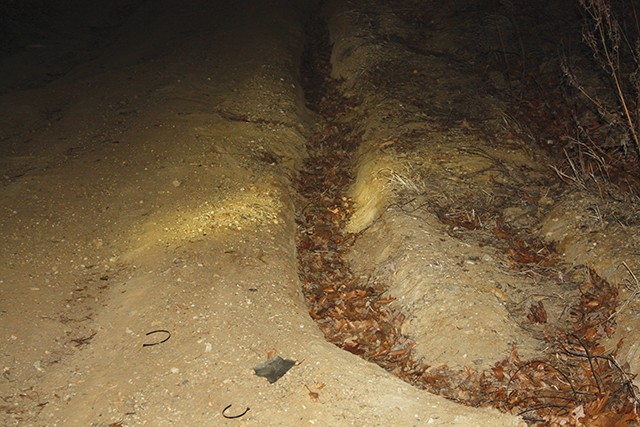
“(H)is actions are not themselves a criminal act,” Watson writes. “Unfortunately, in spite of safety recommendations, parents allow their children, under 16, to drive ATV/UTVs without helmets and/or seat belts. Parental allowance of this kind happens regularly and at no time is it construed as criminal. However, because in this case the result was Madyson’s death, a different outcome is sought. The state must look at the facts in cases, rather than the results, in considering criminal charges.”
Mady was the second person younger than 16 who died in an ATV crash last year in Macoupin County, Kahl says, and another child died in a third accident in Jersey County, just over the county line. All three deaths, the sheriff figures, were preventable.
Loftis says she once worried about how Mady would feel when her older brother moved away from home – it would be just her husband, herself and their daughter. “And you turn around and you wake up one day and you don’t have that,” Loftis says. “I’ve been a mom for 19 years, those were my responsibilities. Now what do I do? It’s definitely a lost feeling.”
Without being sued, insurance companies for Ruyle’s parents settled for $400,000, according to probate files. Beeman says it’s not worth suing Ruyle – it likely would cost more than could be recovered. Loftis says this isn’t about money.
“It just infuriates me that he gets nothing,” she says.
Contact Bruce Rushton at [email protected].


